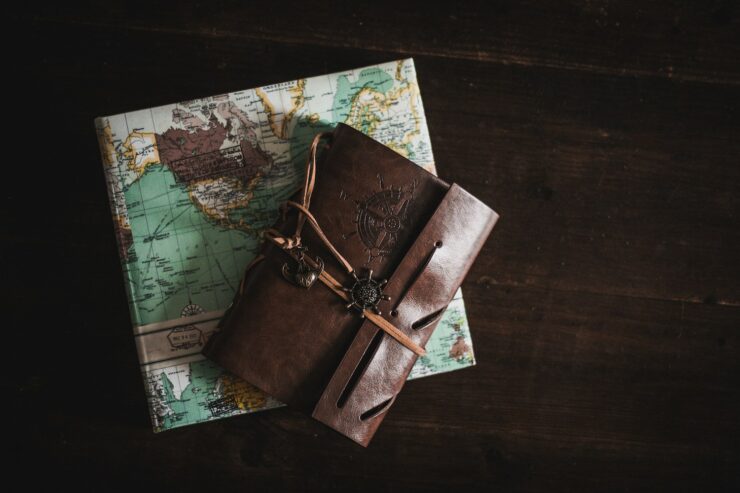The things I remember best from the fantasy novels I encountered as a youth are journeys. Ged leaves Gont, eventually leaves Roke, visits strange islands and sails across the sea. Sam and Frodo walk ever so many miles. There are boats big and small, whether for long journeys or for simply messing about in. There are horses, from Shadowfax to Artax and beyond, and there are other creatures that might lend a protagonist a ride; there are railroads and subways and wardrobes.
In fantasy, people are always going somewhere. And this feels like both the most obvious thing in the world and something I had never thought about until I sat here, deep in the late-summer doldrums, and found myself wanting to go—that fantasy is not just a means of going somewhere else when one cannot travel, but an education in, and encouragement toward, traveling itself.
No, we’re not sleeping under the stars with our cloaks rolled up under our heads, or at least most of us aren’t. We are not riding noble steeds for hundreds of miles or getting seasick in terrifying handcrafted vessels while we cross unknown oceans. (No talking ships, either, alas.) But we are going on walks and getting on airplanes (basically magic, if you squint) and taking trains and stepping, in a very real way, from one world into the next, transforming as we go. Often we are doing these things alongside companions, or at least strangers moving in the same direction.
Practically speaking, when setting out on a journey you need very good shoes, or very resilient feet. You need clothes you don’t have to wash too often (I am thankful for modern plumbing on a maybe-weirdly-regular basis). You need a map, which is now in the little science fictional device you carry in your pocket, or possibly in your pack or glovebox if you are venturing somewhere where that science fictional device doesn’t quite work the way you’d want it to. Maybe you need a guide. Maybe you need a plan, if you are going for a very, very long walk, which people do on purpose, on the regular, all the time. Maybe you have to weigh the things you’re putting in your pack and carefully consider how many times you want to wash your underwear in a sink. (Let’s not talk, or even think, about the state of undergarments in your average fantasy novel.)
When I am traveling, with today’s many modern conveniences, water-bottle-refilling stations, generally functioning toilets, terrible cramped airplane seats, or swelteringly hot broken-AC train cars, I think a lot about fantasy, and how long it took everyone to get to their extremely important destinations. How they probably had no variety in their dinners most of the time. How dirty and miserable it must have been, and how rarely authors make us think about that. (Mostly.) I think about how part of the magic of fantasy is that going somewhere new always changes you: you meet an important person, discover an important item, make major steps on your quest, wind up with a horrible setback. I think about the characters in Kristen Cashore’s Winterkeep who meet, in a new country, sentient blue foxes, and about traveling via house with chicken feet (in Gennarose Nethercott’s Thistlefoot, most recently, but in many older stories as well). I think about how far Essun goes in The Broken Earth series—how far, and to how many strange places.
Bookish people talk a lot about what books do for us; there is a perpetual and exhausting argument, for example, about whether reading makes one a better person, which then leads to more questions about what that means, and then more questions about what one reads, and the quality of said reading. I don’t read with the goal of self-improvement, though I do think the inevitable outcome of reading widely and diversely is that you understand more things about more people. Generally, that seems like a win.
But maybe there are more pragmatic things. Does reading make us more curious? When you encounter a word you don’t know in a book, do you look it up, or figure it out from context clues? Do you find out about things you very much want to eat? Do you learn about other countries, fictional or real? Does reading about made-up places ever so often give you insights on the place you live, how it works, what matters in it, why the people are how they are? Does it make you think twice about trees, or crows, or the importance of a good hat? Does it turn you into someone who wanders whenever possible and wishes to learn to properly wave swords around?
It would have been very easy, as a small child growing up in a small town, to not understand or be curious about how much else was out there. Every so often, as a kid, I read a book set in the real world, and those made me curious too. But I think fantasy was what made me want to go. If you grow up in a fantasy novel, there is probably a coming-of-age quest in your future whether you like it or not. You have to find your way, sometimes whether you want to or not. Fantasy told me that those journeys were difficult, and long, and exhausting, and also necessary and astonishing. Sometimes they are less literal journeys—the kind that eat up miles—and more mental, or emotional, or spiritual. One way or another, they lead to change.
You grow up in this world, and if you’re lucky, you get to invent your own coming-of-age adventure. Maybe across the world; maybe in your own backyard. And then you get to do it again, and again, whenever there is something new to find, and somewhere else to go.










